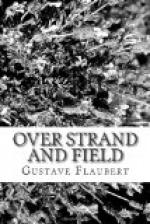The Chateau d’Amboise, which dominates the whole city that appears to be thrown at its feet like a mass of pebbles at the foot of a rock, looks like an imposing fortress, with its large towers pierced by long, narrow windows; its arched gallery that extends from the one to the other, and the brownish tint of its walls, darkened by the contrast of the flowers, which droop over them like a nodding plume on the bronzed forehead of an old soldier. We spent fully a quarter of an hour admiring the tower on the left; it is superb, imbrowned and yellowish in some places and coated with soot in others; it has charming charlocks hanging from its battlements, and is, in a word, one of those speaking monuments that seem to breathe and hold one spellbound and pensive under their gaze, like those paintings, the originals of which are unknown to us, but whom we love without knowing why.
The Chateau is reached by a slight incline which leads to a garden elevated like a terrace, from which the view extends on the whole surrounding country. It was of a delicate green; poplar trees lined the banks of the river; the meadows advanced to its edge, mingling their grey border with the bluish and vapourous horizon, vaguely enclosed by indistinct hills. The Loire flowed in the middle, bathing its islands, wetting the edge of the meadows, turning the wheels of the mills and letting the big boats glide peacefully, two by two, over its silvery surface, lulled to sleep by the creaking of the heavy rudders; and in the distance two big white sails gleamed in the sun.
Birds flew from the tops of the towers and the edge of the machicolations to some other spot, described circles in the air, chirped, and soon passed out of sight. About a hundred feet below us were the pointed roofs of the city, the empty courtyards of the old mansions, and the black holes of the smoky chimneys. Leaning in the niche of a battlement, we gazed and listened, and breathed it all in, enjoying the beautiful sunshine and balmy air impregnated with the pungent odour of the ruins. And there, without thinking of anything in particular, without even phrasing inwardly about something, I dreamed of coats of mail as pliable as gloves, of shields of buffalo hide soaked with sweat, of closed visors through which shot bloodthirsty glances, of wild and desperate night attacks with torches that set fire to the walls, and hatchets that mutilated the bodies; and of Louis XI, of the lover’s war, of D’Aubigne and of the charlocks, the birds, the polished ivy, the denuded brambles, tasting in my pensive and idle occupation—what is greatest in men, their memory;—and what is most beautiful in nature, her ironical encroachments and eternal youth.




